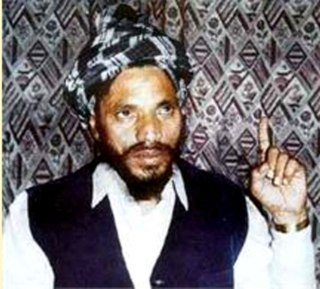
The U.S. Securities and Exchange Commission (SEC) is an independent agency of the United States federal government, created in the aftermath of the Wall Street Crash of 1929. Its primary purpose is to enforce laws against market manipulation.

The term Khalsa refers to both a community that follows Sikhism as its religion, as well as a special group of initiated Sikhs. The Khalsa tradition was initiated in 1699 by the Tenth Guru of Sikhism, Guru Gobind Singh. Its formation was a key event in the history of Sikhism. The founding of Khalsa is celebrated by Sikhs during the festival of Vaisakhi.

The Dasam Granth is a collection of various poetic compositions attributed to Guru Gobind Singh. The text enjoyed an equal status with the Adi Granth, or Guru Granth Sahib, in the eighteenth and nineteenth centuries and were installed side by side on the same platform. The Dasam Granth lost favor during the colonial period when reformist Singh Sabha Movement scholars couldn't contextualize the reworkings of Puranic stories or the vast collection of 'Tales of Deceit' Sri Charitropakhyan.

3HO , also known as Sikh Dharma of the Western Hemisphere or Sikh Dharma International, is a controversial American organization founded in 1969 by Harbhajan Singh Khalsa, also called "Yogi Bhajan". Its adherents are popularly referred to as the Sikh Dharma Brotherhood. While referred to as the 3HO movement, "3HO" is strictly speaking the name only of the movement's educational branch. Scholars have defined 3HO as a new religious movement.

Yogi Bhajan, also known as Siri Singh Sahib to his followers, was an American entrepreneur, cult leader, yoga guru, and putative spiritual teacher. He introduced his version of Kundalini yoga to the United States. He was the spiritual director of the 3HO foundation, with over 300 centers in 35 countries. He was accused of sexual abuse by several dozen of his female followers; an investigation called the Olive Branch Report found the allegations most likely true.

The kirpan is a blade that Khalsa Sikhs are required to wear as part of their religious uniform, as prescribed by the Sikh Code of Conduct. Traditionally, the kirpan was a full-sized talwar sword around 76 cm in length; however, British colonial policies and laws introduced in the 19th century reduced the length of the blade, and in the modern day, the kirpan is typically manifested as a dagger or knife. According to the Sikh Code of Conduct, "The length of the sword to be worn is not prescribed". It is part of a religious commandment given by Guru Gobind Singh in 1699, founding the Khalsa order and introducing the five articles of faith which must be worn at all times.

The Akal Takht is one of five takhts of the Sikhs. It is located in the Darbar Sahib complex in Amritsar, Punjab, India. The Akal Takht was built by Guru Hargobind as a place of justice and consideration of temporal issues; the highest seat of earthly authority of the Khalsa and the place of the Jathedar, the highest spokesman of the Sikhs.

Yogi Tea is an American brand offering organic herbal, green and black tea blends. The company is privately held and operated in North America by East West Tea Company, LLC and YOGI TEA GmbH for Europe.

Piara Singh Bhaniara also known as Baba Bhaniara, was a Dalit religious leader from Punjab, India. He established a Sikh sect in the 1980s, which was opposed by mainline Khalsa Sikhs as insulting to their faith. In 2001, his followers published their own holy text Bhavsagar Granth, and allegedly insulted the Sikh holy book Guru Granth Sahib. This sparked violence against Bhaniara's followers. The Government of Punjab banned Bhavsagar Granth, and arrested and jailed Bhaniara.

Hemlata is an Indian classically trained playback singer in Bollywood. She is best known for her songs in the late 1970s, especially Ankhiyon Ke Jharokhon Se song.
The Sikhs are adherents to Sikhism, the fifth largest organized religion in the world, with around 25 million adherents. Sikh History is around 500 years and in that time the Sikhs have developed unique expressions of art and culture which are influenced by their faith and synthesize traditions from many other cultures depending on the locality of the adherents of the religion. Sikhism is the only religion that originated in the Punjab region with all other religions coming from outside Punjab. All the Sikh gurus, many saints, and many of the martyrs in Sikh history were from Punjab and from the Punjabi people. Punjabi culture and Sikhism are mistakenly considered inseparably intertwined. "Sikh" properly refers to adherents of Sikhism as a religion, strictly not an ethnic group. However, because Sikhism has seldom sought converts, most Sikhs share strong ethno-religious ties, therefore it is a common stereotype that all Sikhs share the same ethnicity. Many countries, such as the U.K., therefore misconcievingly recognize Sikh as a designated ethnicity on their censuses. The American non-profit organization United Sikhs has fought to have Sikhs included on the U.S. census as well, arguing that Sikhs "self-identify as an 'ethnic minority'" and believe "that they are more than just a religion".
Gurmukh Kaur Khalsa is a teacher of Kundalini yoga, as taught by Yogi Bhajan, and a pioneer in the field of pre-natal yoga. She is the co-founder and director of the Golden Bridge Yoga Center in Los Angeles, and the author of two books and three DVDs. She has become a yoga guru for Hollywood film stars.

Hari Jiwan Singh Khalsa is an American Sikh who is Chief of Protocol for the American Sikh group called Sikh Dharma. In 2000 he was convicted on fraud charges, receiving the nickname "Toner Bandit." He is a member of the Grammy award winning New-Age musical group White Sun.
Sikhism has often been criticised by non-Sikhs regarding its texts, practices, and societal norms, but Sikhs and other scholars argue that these criticisms are flawed and are based on a biased and poor understanding of the texts, especially of the multiple languages used in the Sikh scriptures. They also argue that most Western scholars who attempted to interpret Eastern religious texts were missionaries and could not overcome the bias they carried with them, irrespective of whether they were translating the Quran, Vedas, Puranas or the Guru Granth Sahib.
Krishna Kaur Khalsa is an American teacher of Kundalini Yoga as per the teachings of Yogi Bhajan. Born Thelma Oliver, she initially pursued a career as an actress in films and theater. In 1970, she shifted her focus to empowering others through the practice of yoga.

Sikh sects, denominations, traditions, movements, sub-traditions, also known as sampardai in the Punjabi language, are sub-traditions within Sikhism that believe in different approaches to practicing the religion. All sampradas believe in the One Creator God typically rejecting both idol worship and caste systems. Different interpretations have emerged over time, some of which have a living teacher as the leader. The major historic traditions in Sikhism, says Professor Harjot Oberoi, have included Udasi, Nirmala, Nanakpanthi, Khalsa, Sahajdhari, Namdhari Kuka, Nirankari and Sarvaria.

The Jathedar of the Akal Takht is the head of the Akal Takht and head of the Sikhs worldwide. The jathedar has the de facto power as the supreme spokesperson of the Khalsa to summon, trial and sentence any person who identifies as a Sikh from the Akal Takht.

SikhNet is a Sikh-centric website operated by the 3HO organization. SikhNet is a tax exempt 501(c)3 not-for-profit corporation in the U.S.A. It caters to what it has termed as the "cyber sangat".

Sikhs in Chile are a religious minority in Chile. There is no demographic data on the Sikh population living in the country but it is estimated to be less than 1,000.

Sikhs in Mexico are a religious minority in Mexico. There is estimated to be no more than 1,000 Sikhs living in Mexico, with most residing in Mexico City and the Naucalpan region.
















